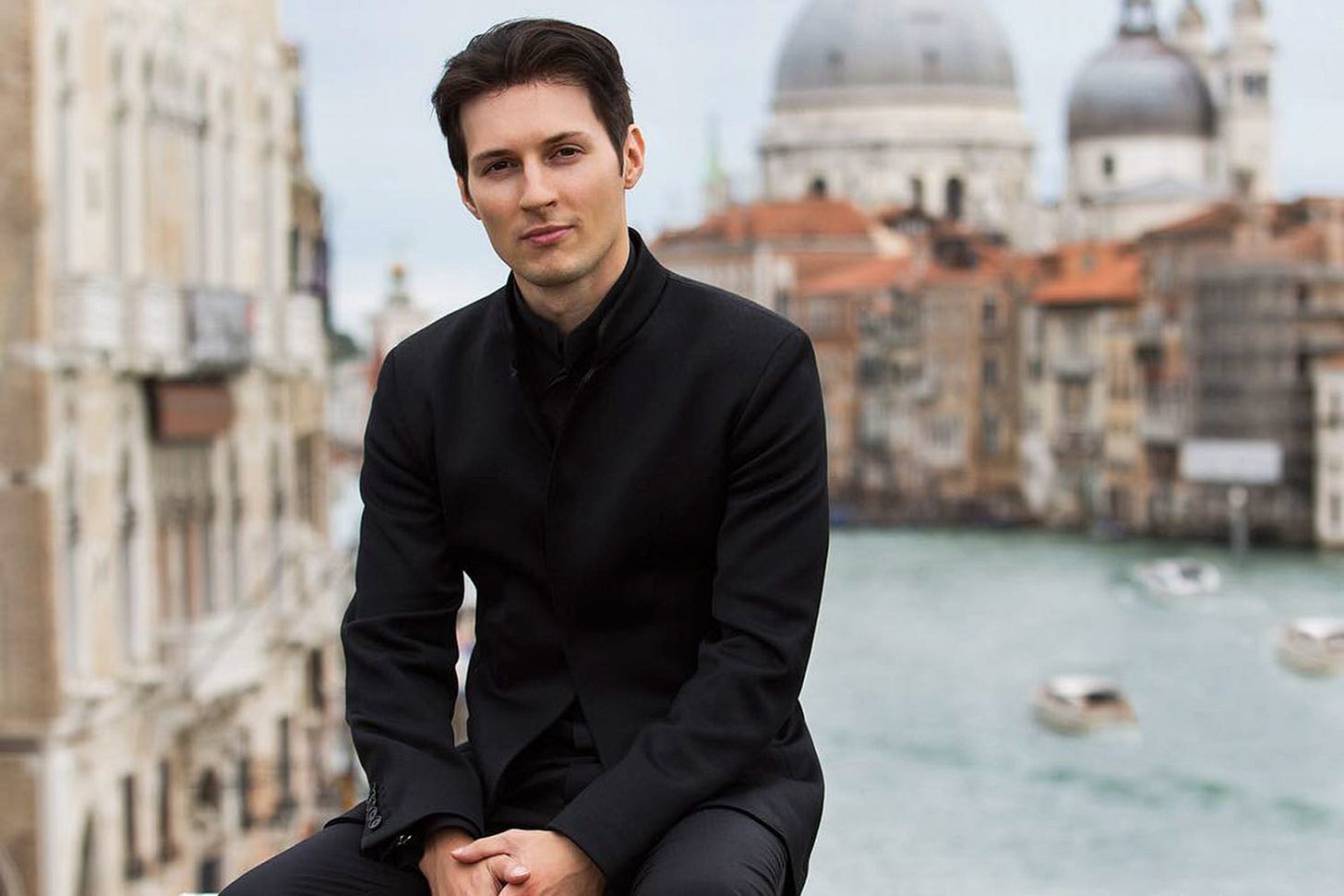Cyber Prince of Russia
How Pavel Durov’s arrest fueled anti-Western sentiment, aiding Russian propagandists
Telegram founder Pavel Durov faces charges in France – a news story that has been overshadowing the war in Ukraine in Russia in recent weeks. Durov is one of the most popular figures and even a role model for an entire generation of young Russians.
Durov As An Icon
I first met Pavel Durov ten years ago, in 2013. Back then, he owned Russia’s most popular social network, VKontakte. His office was located in one of the most legendary historical buildings in St. Petersburg.
Young Pavel Durov in his hometown
At that time, I was heading the most popular independent TV channel in Russia. Pavel and I were almost the same age, and we had a lot in common—we both saw ourselves as icons for the youth. Pavel struck me as someone who had crafted a romantic image for himself and was determined to live up to it. He embodied the character of an enigmatic, aloof superhero who never showed his emotions. In person, he was a charming robot. The party at his office where we met resembled a classic nerd gathering—alcohol was off-limits, but there were a dozen types of freshly squeezed smoothies to choose from.
Pavel had a peculiar sense of humor. The largest meeting room in VKontakte's office resembled a torture chamber, and a skeleton sat in one of the chairs. One popular story within the company was how he would fold hundred-dollar bills into paper airplanes and launch them from his office window.
It was during that time I learned that Durov, the so-called "computer genius," was not a programmer at all but a philologist. He was the visionary and frontman of his business, while the real IT wunderkind who brought his ideas to life was his older brother Nikolai, who always stayed in the background.
At some point, I began to feel that Pavel was so captivated by video games that he was creating personas from the gaming world, living partly in an imagined reality where he saw himself as a mix between Batman and the Joker.
Durov and FSB
But soon, real Russian life invaded this fantasy universe. Durov was accused of trying to run over a police officer with his car. At the same time, the FSB began to pressure him to give up his company. VKontakte had grown so powerful that the Russian state decided it was time to take control.
Durov refused to cooperate with the FSB, bid farewell to VKontakte, and started a new venture—the messenger Telegram. Many Russians use Telegram instead of WhatsApp—driven largely by the strong belief that the FSB cannot access their messages on Telegram. In Russia, Telegram has a reputation as the most secure and therefore the most reliable chat platform. The Russian authorities repeatedly tried to block it, but they failed. Durov’s reputation as a lone superhero who could stand up to the Russian state only grew stronger.
A picture taken during Pavel Durov's recent photoshoot in the desert.
Simultaneously, rumors began to circulate that Durov was actually an FSB agent, and that their feud was just a ruse to confuse everyone and lure as many enemies of the Russian regime into Telegram. To me, this conspiracy theory always seemed utterly unconvincing. Primarily because I saw Durov personally—I was confident that someone like him, who lived in his imagined world and crafted reality according to his vision of how he wanted to be perceived, could never convince himself that cooperating with the Russian authorities was cool or heroic.
A few years ago, he posted semi-nude photos of himself on Instagram, taken in the desert—evoking the unmistakable aesthetic of "Prince of Persia." Pavel saw himself as a mysterious prince, misunderstood and sought after by everyone. And soon, he said, thanks to his new crypto platform TON, he would become the richest person in the world.
Durov always dressed in black: a black T-shirt, black jeans, and black sneakers. Even when he went for a walk, a car would follow him, carrying spare T-shirts, jeans, and sneakers—just in case his clothes got dirty and he needed to change.
Over the past ten years, Pavel Durov has become a real idol for countless young Russians. A mystical hero who made himself, amassed a colossal fortune, built several tech businesses from scratch, and never bowed to government pressure—an ideal hero for many young Russians.
Durov never criticized Putin, but even the fact that he left Russia was a clear sign that he was against the regime.
Durov in France
On August 24, Durov, now a citizen of France, Saint Kitts and Nevis, the UAE, and Russia, was arrested at Le Bourget airport in Paris. French police charged Durov with 12 offenses related to his inaction regarding crimes committed using the Telegram platform, including drug trafficking, cybercrimes, fraud, hosting pornographic content, money laundering, and more. On August 28, he was released on bail of 5 million euros and prohibited from leaving France.
The arrest in France, of course, only adds to Durov’s heroic image. It’s fascinating to see how Russian propaganda has seized on Durov’s arrest. Anton Gorelkin, a Russian parliament member, suggested “organizing a daring escape for Pavel Durov to Russia, where he could spread his wings and use Telegram to challenge the monopoly of American big tech, making it a stronghold in the fight against the ideology of a unipolar world.”
Shaman, a propagandist musician and the chief singer of modern Russian fascism, even recorded a video message addressed to Durov: "Pasha, my dear! It’s only in Russia that one can breathe freely and easily. Come back home. You are remembered, loved, and always awaited here," he said mockingly, with a smile.
Durov and Tucker Carlson
This, of course, is a remarkable mockery. Durov left Russia because of his conflict with the FSB, precisely because he wasn’t allowed to breathe freely, work, and grow his business.
Parlamentarian Gorelkin, of course, knows this. That’s why he added that the condition for the escape must be Pavel’s own decision: first, he must “choose a side” and demonstrate his intention to “act accordingly.”
But Shaman isn’t really speaking to Durov, nor does he expect to be heard by him. This is, of course, a fight for Pavel's audience, his followers—those people in Russia who live as if in internal exile, hoping to leave if the opportunity arises. Among them are programmers and other young professionals who, looking at Durov, understand that there is no hope for creative freedom and business in Russia.
The arrest of Pavel Durov in France is a major moral blow for his followers. Russian propaganda is trying to turn this to its advantage. As usual, it broadcasts the message that everywhere is the same, and the rules in Europe are no different from those in Russia. There is no freedom of speech or fair trial anywhere—so if there’s no difference, why leave Russia? Here, at least, everything is familiar and our own.
Over the past two years, this has become the most effective thesis of Russian propaganda within the country: democracy does not exist in nature; all countries are equally corrupt, courts are biased everywhere, the media are deceitful, and human rights are a joke everywhere. Strangely enough, this cynical skepticism is what the Russian public buys most readily. And now, the arrest of a superhero, a mystical saint, is seen as incredible proof of the propaganda’s truth.
Suddenly, an extraordinary unity has emerged in Russia: Putin’s supporters and his opponents, staunch fascists and closet liberals—nearly everyone believes that Durov is an innocent victim.
This kind of consensus would have seemed impossible not long ago. But in a strange way, life has been simplified and now resembles a computer game.








